
 Though it’s been repackaged by Blumhouse for primarily horrific purposes, the story of Ma, I believe, is a pretty universal one for many (most?) teens; I mean, how many of us, at one point or another when growing up, hung out at a moderately weird older person’s house, doing things we probably weren’t really supposed to be doing?
Though it’s been repackaged by Blumhouse for primarily horrific purposes, the story of Ma, I believe, is a pretty universal one for many (most?) teens; I mean, how many of us, at one point or another when growing up, hung out at a moderately weird older person’s house, doing things we probably weren’t really supposed to be doing?
I mean … surely I couldn’t have been the only one, right?
Irritating youth Maggie (Diana Silvers, Booksmart) moves with her understanding mother (Juliette Lewis, Natural Born Killers) to a small town in Ohio, mostly to get their feet back on the ground after an ugly divorce. While Mom now has to work overtime at the town’s casino delivering drinks to her high school nemesis, Maggie starts bumming around with other irritating teens down at the local rock pile. You know the type of kids, too: They mostly hang out in front of the liquor store, trying to get adults to buy them booze.
 As a matter of fact, that’s exactly how they meet Sue Ann, or as she likes to be called, Ma (Octavia Spencer, The Shape of Water). Pretty soon, Ma is hooking the kids up with plenty of liquor and drugs and a place to do it all in, all in an attempt to relive her, as we soon learn, miserable teenage years. Seems that, at the hands of the parents of these kids, she was taunted pretty bad, leading to a traumatic moment in a closet with a boy she really liked.
As a matter of fact, that’s exactly how they meet Sue Ann, or as she likes to be called, Ma (Octavia Spencer, The Shape of Water). Pretty soon, Ma is hooking the kids up with plenty of liquor and drugs and a place to do it all in, all in an attempt to relive her, as we soon learn, miserable teenage years. Seems that, at the hands of the parents of these kids, she was taunted pretty bad, leading to a traumatic moment in a closet with a boy she really liked.
I guess you really can’t blame Ma all that much when she imprisons and tortures the teens or, in the case of one dude, intravenously feeds him dog’s blood. While very little of it makes sense, the lynchpin of the film is Academy Award winner Spencer, playing a wholly believable kook, mixing the pathos of pain and pathology of a psychotic to create a fully memorable character; too bad she’s trapped in a mostly mediocre movie.
As I was about halfway through the movie though, I started to think about the people I might have bullied in high school; I could definitely believe it if there’s one guy out there who is just plotting revenge on me, planning to do it through my child. Well, the joke’s on you, man, because I am a childless 41-year-old guy with no prospects for the future. Better luck next time. —Louis Fowler


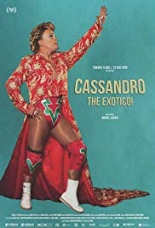

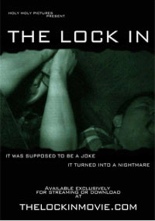
 A group of overly caffeinated teens are on the way to a lock-in at their local church, all hoping to “get crazy” and help a friend possibly kiss a girl. On their way there, however, they stop by an area dumpster and find an old porno magazine; now, as a committed dumpster diver during the first half of the ’90s, believe me, the last thing you want in your hands is trashed porn, with layer after layer of grimy, stuck-together pages, simply dripping with the devil’s country gravy.
A group of overly caffeinated teens are on the way to a lock-in at their local church, all hoping to “get crazy” and help a friend possibly kiss a girl. On their way there, however, they stop by an area dumpster and find an old porno magazine; now, as a committed dumpster diver during the first half of the ’90s, believe me, the last thing you want in your hands is trashed porn, with layer after layer of grimy, stuck-together pages, simply dripping with the devil’s country gravy.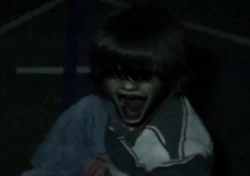 The magazine is quickly discovered by Pastor Chris; his solution is to burn it outside as quickly as possible. A few minutes later, however, the magazine is back, showing up again in the backpack. When they try to throw it away, a demonic growl is heard and a garbage can is thrown down the hall. Fearfully moving down the stairs, the teens find themselves in a dark and empty church, and then the forced horror truly begins.
The magazine is quickly discovered by Pastor Chris; his solution is to burn it outside as quickly as possible. A few minutes later, however, the magazine is back, showing up again in the backpack. When they try to throw it away, a demonic growl is heard and a garbage can is thrown down the hall. Fearfully moving down the stairs, the teens find themselves in a dark and empty church, and then the forced horror truly begins.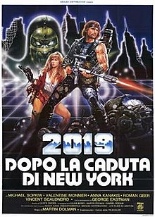
 The year is 2019. America is under the rule of a tyrannical despot that will, without mercy, capture and kill those who don’t meet his idea of genetic perfection simply to attain his primarily dark goals of world domination. No, it’s not the long-awaited Donald Trump biopic — give it a few years, though — instead, it’s the
The year is 2019. America is under the rule of a tyrannical despot that will, without mercy, capture and kill those who don’t meet his idea of genetic perfection simply to attain his primarily dark goals of world domination. No, it’s not the long-awaited Donald Trump biopic — give it a few years, though — instead, it’s the 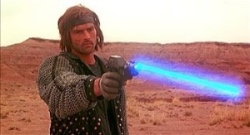


 Only in the 1970s — or at least the New World Pictures version of the 1970s — could you make absolute heroes out of a pair of cop-shooting, hostage-banging, dynamite-toting bank robbers the way that the drive-in favorite
Only in the 1970s — or at least the New World Pictures version of the 1970s — could you make absolute heroes out of a pair of cop-shooting, hostage-banging, dynamite-toting bank robbers the way that the drive-in favorite 